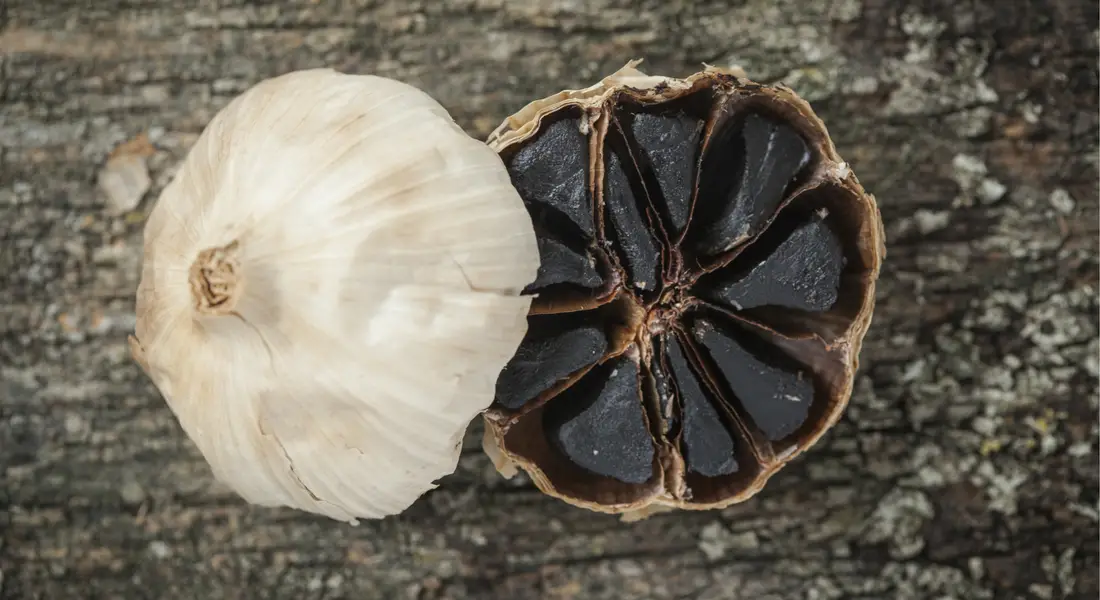People in Asia have used raw black garlic both in recipes and for its health benefits for a long time. The black bulb happens due to fermenting raw garlic through prolonged exposure to heat and humidity. Black garlic has a sweet and mellow flavor with an inky hue.
Here are the different health benefits of black garlic.
Black Garlic Helps to Lower Cholesterol
Black Garlic Protects Against Diseases
Garlic is well-known for its antioxidant benefits, but new research shows that raw black garlic contains two times more antioxidant activity than white garlic. These antioxidants protect the cells from disease and may slow down the aging process. Studies are being conducted to determine how effective raw black garlic is at battling chronic disease. Researchers believe that the high antioxidants offer protection to the free radicals that cause the damage. Free radicals damage the cells and help cause heart disease, rheumatoid arthritis, Alzheimer’s, and other chronic diseases.
Black Garlic Contains Vitamins and Other Nutrients
Black Garlic May Help Diabetics

Black Garlic May Protect Brain Health
Black garlic may protect brain health due to its nutritional content. This type of garlic is rich in compounds like allicin, which have been shown to promote cognitive function and protect against age-related mental decline. Additionally, black garlic contains high levels of antioxidants, which can help reduce inflammation and protect cells from damage. Some research has even suggested that black garlic may help to improve symptoms of Alzheimer’s disease. While more studies are needed to confirm these effects, there is evidence that black garlic may be a valuable tool for protecting brain health.
Black Garlic May Improve Live Health
One of black garlic’s benefits is that it may improve liver health. The antioxidants in black garlic can help protect the liver from damage and disease. Additionally, some studies have found that black garlic may help reduce the build-up of fat in the liver. It can be helpful for those who are at risk of developing fatty liver disease. Moreover, black garlic may help improve enzymes’ function in the liver. These enzymes are essential for detoxification and metabolism.
Black Garlic May Have Anti-Cancer Properties
Black garlic may also have anti-cancer properties. It is due to the high levels of antioxidants present in black garlic, which can help to protect cells from damage and prevent the growth of cancerous cells. Additionally, black garlic contains compounds like allicin, which have been shown to have anti-tumor effects. Some studies have even found that black garlic may help reduce tumors’ size. However, more research is needed to confirm these effects.
How to Use Black Garlic
Black garlic is a flavorful, aged variant of traditional garlic with a deep, rich flavor. It can be used in various dishes, from salads to salad dressings, and its unique taste is sure to please any garlic lover. When using black garlic, add it towards the end of cooking so that its flavor is not overwhelmed by other ingredients. Black garlic is a versatile ingredient that can add depth and flavor to any dish.
Side Effects of Black Garlic
 |
Try Dr. Nandi’s Black Garlic Tomato SauceYou’ll love Dr. Nandi’s Black Garlic Tomato Sauce! Add it to Zucchini noodles for a meal fit for a Health Hero! |
References:
- Physicochemical Properties, Biological Activity, Health Benefits, and General Limitations of Aged Black Garlic: A Review – PMC (nih.gov)
- Black Garlic and Its Therapeutic Benefits | IntechOpen
- Black Garlic: Health Benefits, Nutrients per Serving, Preparation Information, and More (webmd.com)
- 4 Health Benefits of Black Garlic – Cleveland Clinic
- 6 Black Garlic Benefits That Stand To Improve Your Health | Well+Good (wellandgood.com)
- Black Garlic North America™ – Black Garlic Health Benefits (blackgarlicna.com)
- Physicochemical Properties, Biological Activity, Health Benefits, and General Limitations of Aged Black Garlic: A Review – PubMed (nih.gov)
- Black Garlic and Its Bioactive Compounds on Human Health Diseases: A Review – PMC (nih.gov)














 Subscribe to Ask Dr. Nandi YouTube Channel
Subscribe to Ask Dr. Nandi YouTube Channel









